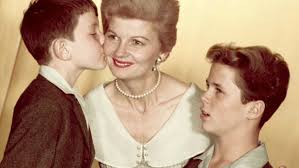
- Art is not a separate category of human endeavor, like “business,” “psychology,” “pest control,” “education,” or “politics.” Some men and women make a living by creative pursuits, and we call them “artists” (or dancers, authors, screenwriters, photographers). But in the broadest sense, art is something we are all called to, as imitators of our creative Father. Art is one way we experience life, and to pay little or no attention to it is to miss an entire dimension of human experience.
- Artists are not special people—they’re just like you and me, with families, backgrounds, financial
 concerns, virtues, and sins. Some artists like to think they’re special, it’s true. They’re the ones who give “art” (scare-quote art) a bad name. If God isn’t front and center as their Maker and Redeemer they’re likely to set themselves up as makers and redeemers of the culture, and with a whole lotta luck and the right connections, they might even get paid for it. But church-member Michael who owns a share in the downtown gallery and teaches drawing at the local community college—and comes late to Sunday school and doesn’t say much—isn’t one of those. He’s a guy with a particular vision and gift. You should talk to him about it sometime. Don’t be intimidated.
concerns, virtues, and sins. Some artists like to think they’re special, it’s true. They’re the ones who give “art” (scare-quote art) a bad name. If God isn’t front and center as their Maker and Redeemer they’re likely to set themselves up as makers and redeemers of the culture, and with a whole lotta luck and the right connections, they might even get paid for it. But church-member Michael who owns a share in the downtown gallery and teaches drawing at the local community college—and comes late to Sunday school and doesn’t say much—isn’t one of those. He’s a guy with a particular vision and gift. You should talk to him about it sometime. Don’t be intimidated. - Art is not a matter of knowing what you like. It’s a matter of seeing what you haven’t seen before, or hearing what you haven’t heard. This isn’t teaching, exactly; art can’t teach. It’s not a substitute for sound doctrinal exposition, but can act as a mediator between sound doctrine and life as it’s lived. Also,
- Art is not a tool; it’s an encounter. Bible-story pictures, chalk talks, extended metaphors serving as sermon illustrations—those are tools, direct and unambiguous, and they can be useful for getting a point across. Art is by nature ambiguous and will affect each member of its audience in different ways, or not at all. A story, a painting, a song or symphony doesn’t make points or teach lessons. It sidles up to the individual and walks alongside for a while, leaving its companion a little more insightful or sympathetic, even a little more human, for that brief acquaintance. More about that below.
- Art is not an esoteric subject that only specialists understand. Here again, some artists have muddied the water by creating a club of the like-minded for the benefit of each other—when they’re not stabbing each other in the back, that is. Also for looking down on the rubes. But most of us rubes can be taught to see if we are trained to look. That’s one vital service artists can perform for their church body: sharing what they know and opening windows of understanding for the rest of us. (Wednesday-night art appreciation class after the prayer meeting? Why not?)
- Art should be encouraged. That appreciation class? It’s not just for the ladies’ book club and
 the amateur painter, but also for the pastor and elders and their wives and women’s ministry leaders. They should go. And they should ask questions.*
the amateur painter, but also for the pastor and elders and their wives and women’s ministry leaders. They should go. And they should ask questions.* - Art, like everything else, stands in need of redemption. That’s where artists need the church, as much as the church needs them.
- Art can’t do everything (like teach or preach). But what it can do, it does like nothing else: 1) awaken the imagination—the “bright wings” that gild ordinary experience; 2) illuminate what we already know, and breathe life into propositional truth; 3) unify the mind and heart.
- Art is for all Christians, who are equipped to know, better than the secular-minded, what it’s for. They just need to better understand what it is.
___________________________________________
*Come to think of it, the whole church would benefit if some time were set aside, once/quarter or once/month, for members to share about their profession: what it entails, how it benefits the community, how they do it for the glory of God, and how they might do it better. Retired people and stay-at-home moms, too! Think how much better we could know and encourage one another if we knew what occupied 1/3 of a brother’s or sister’s time!



 it connects the individual to his community and creates a sense of obligation (as opposed to entitlement). You show up; you do the job; you get paid. Less than half of Americans get jobs while still in their teen years, and when they do enter the work force in their mid-twenties, they don’t seem to know what to expect. I hear about millennials who have to be corrected carefully so as not to ruffle their feathers, and who get frustrated after eight months because they’re not “having an impact.” Then there are those blue-collar dropouts who simply don’t show up.
it connects the individual to his community and creates a sense of obligation (as opposed to entitlement). You show up; you do the job; you get paid. Less than half of Americans get jobs while still in their teen years, and when they do enter the work force in their mid-twenties, they don’t seem to know what to expect. I hear about millennials who have to be corrected carefully so as not to ruffle their feathers, and who get frustrated after eight months because they’re not “having an impact.” Then there are those blue-collar dropouts who simply don’t show up.


 A culture that accepts “gender fluidity” shouldn’t have any qualms about shifting matter, but I suspect the idea makes most of us a little nervous, like Einstein. It shouldn’t. No advance on the frontiers of science speaks to the reality of God better than the quantum revolution. The basic theory states that two mutually exclusive propositions can be true—the cat is dead and alive, the particle is here and there—until the moment they are observed or measured, at which time they “decohere.” It’s the observer who settles the issue of just where the particles are at any given time.
A culture that accepts “gender fluidity” shouldn’t have any qualms about shifting matter, but I suspect the idea makes most of us a little nervous, like Einstein. It shouldn’t. No advance on the frontiers of science speaks to the reality of God better than the quantum revolution. The basic theory states that two mutually exclusive propositions can be true—the cat is dead and alive, the particle is here and there—until the moment they are observed or measured, at which time they “decohere.” It’s the observer who settles the issue of just where the particles are at any given time.
 souls with him. There’s always some extra hellish touch to these events. This time it’s the nature of the crowd: teenagers, most of them, the vast majority girls. Girls in swift transition, trying to figure out who they are and what they’re worth, temporarily attracted to a pop singer. I don’t know anything about Ariana Grande, but they would have grown out of her, probably, if someone had not decided they didn’t deserve to live. Girls–screaming, bleeding, writhing, dying.
souls with him. There’s always some extra hellish touch to these events. This time it’s the nature of the crowd: teenagers, most of them, the vast majority girls. Girls in swift transition, trying to figure out who they are and what they’re worth, temporarily attracted to a pop singer. I don’t know anything about Ariana Grande, but they would have grown out of her, probably, if someone had not decided they didn’t deserve to live. Girls–screaming, bleeding, writhing, dying.
 I’d collected, whatever sins I’d slipped into, there was always tomorrow. There was always a new start, new resolutions, a new opportunity to rise up on wings as eagles.
I’d collected, whatever sins I’d slipped into, there was always tomorrow. There was always a new start, new resolutions, a new opportunity to rise up on wings as eagles.
 off in directions you never anticipated.
off in directions you never anticipated.








